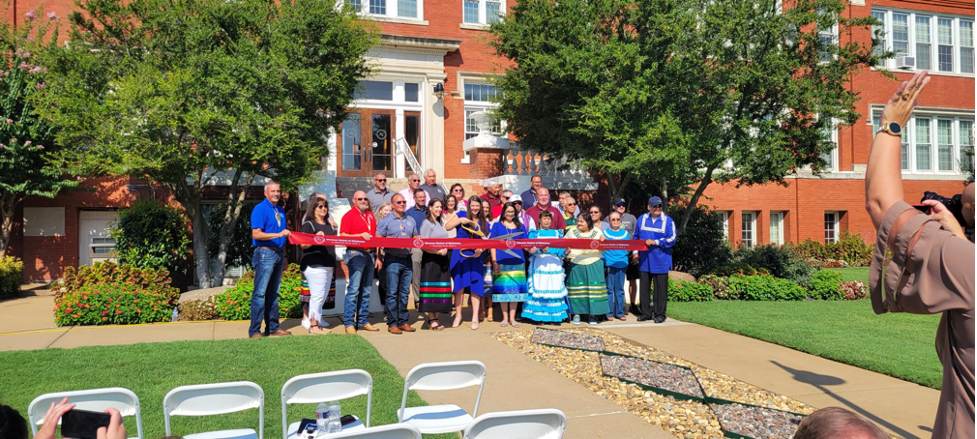Introducing the Choctaw Nation’s Ahni Center
By Deanna Chancellor, NCARC Project Director
On August 25, the Choctaw Nation of Oklahoma held the grand opening for its Ahni Family Justice Center, the first Tribal Child Advocacy Center (CAC) in Oklahoma. Located on the third floor of the Chief Gregory E. Pyle Tribal Complex in the town of Durant, the Ahni Center will provide supportive services to child victims of crimes and their families. It will address the physical and emotional needs of victims of child abuse, domestic violence, and sexual assault and provide the services to begin the healing process. When fully operational, the Ahni Center will provide for forensic interviews, Sexual Assault Nursing Exams for adults and children, and therapy for child and adult victims. In addition, the center will provide referrals for victim services, assistance with victim services applications, victim advocacy, and court preparation.
As a Choctaw Nation member and a longtime believer in the CAC model, I was thrilled to be in attendance at the Ahni Center’s grand opening. Prior to my time directing the Native Child Advocacy Resource Center, I directed the Leflore County CAC, one of four non-Tribal CACs that served the Choctaw Nation. Our reservation is enormous, spanning 11 counties in southeastern Oklahoma. While each of the four existing CACs have a long history of successful collaboration with the Tribes and were already offering state-of-the-art, culturally responsive CAC services to Choctaw children and families, parts of our population were underserved.
That is where the Ahni Center comes in. Its location in Durant is one of two geographical areas of our nation that were located far from existing CAC services. This winter our nation will be opening a second CAC location, the Ahni House in the town of Hugo, to meet the needs of the other underserved geographical area on our reservation. I’m incredibly proud of my nation for recognizing the importance of CACs to our children, families, and communities, and I am in awe of the community champions who came together to get the Ahni Center off the ground. It was only about a year and a half ago that our nation, with the help of OJJDP and NCA funding, got its multidisciplinary team (MDT) off the ground, and they have already had a ribbon cutting on a CAC facility. This couldn’t have happened without the investment of our Tribal leadership. Our nation’s Chief attended the grand opening, as did our Assistant Chief, our Chief Prosecutor, and a Tribal Councilwoman who has been instrumental in the development of child and family services on our lands.
As I mentioned, our nation has a history of close collaboration with the non-Tribal CACs in the area. For years our leaders have always been ready to ensure that the CACs serving our children and families have the cultural resources they need to do so effectively. The Choctaw Nation has also regularly contributed financial support to CACs when the CACs have identified needs that they aren’t able to pay for with other funding sources. So it has always been evident that our nation’s leadership understands the importance of the services that CACs offer our children, and now they are taking the next step, a step that puts them in the forefront of the movement to develop Tribal CACs in Oklahoma. And just as our nation’s children and families have benefited from the services provided by non-Tribal CACs, the Ahni Center and the Ahni House will be open not only to Choctaw Nation members but to non-Tribal children and families in the area.
It helps me sleep better at night knowing that my nation is committed to helping our children and families, as well as the children and families of our neighbors in Southeast Oklahoma, get the services they need to heal from some of the worst experiences a person can go through. And I am immensely excited, in my current position at NCARC, to be able to support other Tribes across the country as they embark on their own journeys toward CAC development.


